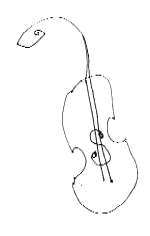An immodest proposal.
Microsoft has sold Slate to the Washington Post Company. Bravo.
It made good enough sense when Bill Gates recruited Michael Kinsley to Redmond to develop one of the first online magazines. But, in the end, Slate wasn't a good match with the mass-Web content of MSN. Points for Microsoft for doing the right thing.
There's another Seattle-born media success that could use similar rethinking.
A few years ago the last of the renowned Bullitt family of Seattle sold all their radio and TV stations. Except one. They gave KING-FM, their venerable classical music station, to the Seattle arts community. It remains a commercial station, whose profits are distributed among the Seattle Symphony, Seattle Opera, and other community assets.

I want to be positive, here. Let's just say, KING-FM possesses great, unrealized potential.
When the new KING-FM was launched, it made business sense to make a deal with one of the corporate radio companies operating stations in Seattle to sell time on KING-FM along with their own. This kept advertising money coming in without the cost of mounting a sales staff.
Under conventional wisdom, since most radio advertising is sold by the ratings percentage point, the arrangement meant KING-FM should get its statistical share of the market's radio advertising dollar.
The trouble is, I believe, like Microsoft-Slate, this undersells KING-FM. Of all formats, classical music radio can be sold on its merits--the unique audience it delivers to advertisers, and the unique environment it creates for their commercials.
I can tell you from professional experience, when a radio sales staff has several ratings-compatible stations to sell, the station with the highest rates and easiest format to explain is what they spend their time selling. KING-FM is undoubtedly an add-on to ratings-driven spot buys of KOMO-AM (news) and KVI-AM (talk).
Maybe I'm wrong. Maybe the KOMO-KVI salespeople are out there pitching KING-FM on its merits. Or maybe one oddball salesperson has taken KING-FM as her/his labor of love. I do hear promotions with high-end local advertisers, and such slam-dunk classical-station merchants as the local violin shop.
But I also hear raucous car stereo spots--because nobody asked the client to provide a different spot to run among the scherzi. And I hear herbal happy pills and chemical "brain support" supplements, 800-number repeated three times. KING-FM has lots of commercials, but it's paying a price, I think, and may not be living up to its potential.
My not-so-modest proposal: As a non-profit-yet-not-public, commercial-but-not-corporate entity, KING-FM has a rare opportunity to break out of radio's research-strangled straitjacket.
KING-FM has a talented programming staff, and it sounds better than ever. What it needs is an evangelistic sales manager and a passionate, energetic staff of committed salespeople who love classical radio and love to sell it.
Under the Washington Post Company, Slate is going to fly. KING-FM won't find a similar corporate parent in the radio business. But, it may be the only major market radio station in the country that is in a position to do the job for itself.




No comments:
Post a Comment